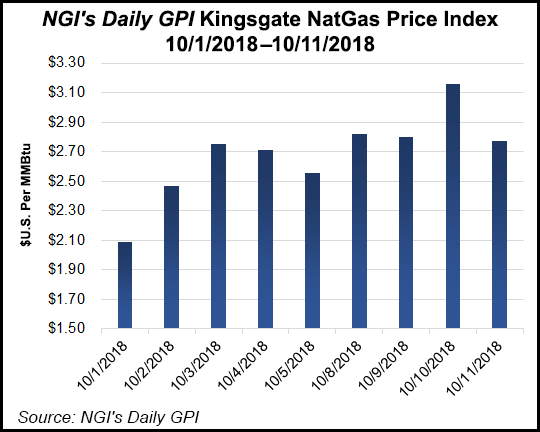NGI The Weekly Gas Market Report | Infrastructure | Markets | NGI All News Access
Natural Gas Service, Prices ‘Stabilized’ in BC, Western U.S. Following Pipeline Rupture
Natural gas distributors resumed service Thursday in British Columbia (BC) and Washington state after Enbridge Inc. restarted flows through one of two pipelines that escaped damage when a parallel conduit in its Westcoast Transmission ruptured and exploded.

The National Energy Board late Wednesday gave Enbridge approval to restart the unharmed 30-inch diameter gas pipeline, which is in the same right-of-way as a 36-inch pipeline in BC that exploded on Tuesday. The mishap shut down both of the Westcoast Transmission system pipes because the undamage pipe was shut in as a precaution.
Puget Sound Energy (PSE) described its supply for the Seattle region as “stabilized” with help from other utilities in the northwestern United States and by Northwest Pipeline, which has connections with U.S. production as well as BC imports.
“Our calls for conservation are over for both business and residential customers,” said PSE. “We are now reaching out to business customers who curtailed their usage to let them know they may resume normal gas use.”
FortisBC resumed service at a slower pace because it relies on the Westcoast system for about 80% of its gas. Northwestern U.S. distributors normally import about one-half of their supplies from BC, and they can turn to U.S. gas in an emergency.
The BC distributor said it still “is asking customers to avoid nonessential use of gas until the situation is completely resolved.”
At the site of the mishap near the northern industrial city of Prince George, flows resumed at 80% of full operating pressure through the 30-inch pipe. Accident investigations and repairs continued on the parallel, ruptured pipe.
“Gas supply will continue to be constrained until the 36-inch gas line is repaired,” FortisBC said. Enbridge said it did not yet have a time estimate “on the investigation process, nor a timetable on repairing and returning the 36-inch line to service.”
When in good operating condition, the Westcoast system carries more than 2 Bcf/d, enough to satisfy B. demand with about 800 MMcf/d left over for U.S. exports.
As in BC, high-volume industrial gas users were the first to lose service in Washington as a result of the Westcoast accident. Commodity traders and analysts speculated that motor gasoline prices would jump if a prolonged disruption of natural gas fuel for heat processes forced refineries to shut down for long.
The interruption of BC exports drove northwestern U.S. natural gas prices up by about 10% on Wednesday, into the US$3.35/MMBtu range.
Western Canadian prices on Wednesday headed in the opposite direction, touching bottoms well below US$1.00 in the most directly affected production areas, because the loss of Enbridge-Westcoast export service aggravated a supply glut across northern BC and Alberta supply fields.
Upon the restart of the unaffected line on Thursday, the expected increase in supply allowed downstream U.S. markets to soften considerably. Malin spot gas plunged 43 cents to $2.915, and PG&E Citygate tumbled 26 cents to $3.505.
In the Rockies, Kingsgate dropped 38.5 cents to $2.775, and Opal fell 38.5 cents to $2.865.
Canadian points, meanwhile, bounced back from Wednesday, with next-day gas at Westcoast Station 2 jumping more than $1 to $1.95 on the increased takeaway capacity. NOVA/AECO C climbed 13.5 cents to $1.65.
© 2024 Natural Gas Intelligence. All rights reserved.
ISSN © 1532-1231 | ISSN © 2577-9877 | ISSN © 1532-1266 |
